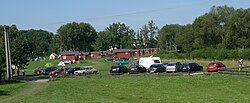Bohušov
Bohušov | |
|---|---|
Municipality and village | |
 | |
 | |
| Coordinates: 50°15′N 17°43′E / 50.250°N 17.717°E | |
| Country | |
| Region | Moravian-Silesian Region |
| District | Bruntál District |
| Area | |
• Total | 7.99 sq mi (20.69 km2) |
| Elevation | 790 ft (240 m) |
| Population (2010) | |
• Total | 466 |
| • Density | 58/sq mi (23/km2) |
| Time zone | UTC+1 (CET) |
| • Summer (DST) | UTC+2 (CEST) |
Bohušov (Template:Lang-de) is a village and municipality in Bruntál District in the Moravian-Silesian Region of the Czech Republic.
Bohušov municipality is located in the western part of Osoblažsko region on the Osoblaha narrow gauge railway and is currently home to 440 inhabitants. It was established by Slavs but after the Mongol invasions had to be rebuilt by Bishop Bruno of Schaumburg in the first half of the 13th century. The village offers great facilities for tourists such as a camping site with modern huts, a pond for swimming and fishing, accommodation with bicycle hire and a newly built sport complex with multifunctional ground (beach volleyball court included). All these services are completed with the information centre.
A dominating feature of the municipality are the Fulštejn castle ruins. In place of the original Slavic fort there was a stronghold established by the impulse of Bishop Bruno of Schaumburg. In 1255 the Bishop gave the stronghold as a benefice to Herbort from Fulme who rebuilt it into the majestic castle which was the largest castle in Silesia in its time. In 1476 the castle was conquered by troops of Matthias Corvinus and also later the Swedish troops caused severe damage to the castle. At this time the castle lost its importance and the final destruction was completed by locals who used walls stones for the construction of new settlements around the castle: Ostrá hora, Kašnice, Grundek and Karlov. Nowadays, despite all the destruction done, there are huge walls together with the forest park still awaiting for visitors to be seen. The castle with the garden are privately owned but they are accessible for visitors free of charge.
In the centre of Bohušov there is the recently renovated St. Martin’s Parish Church where among other things Herbort from Fulme as the founder of Fulštejn Castle is buried in the crypt here. There is also an interesting, richly decorated tomb of the Austro – Hungarian general Laufer who died in World War I. In Bohušov, at the Matějovice exit, there is situated an outstanding building of the Gebauer’s tomb which lies at the Matějovice exit from the village.
On the way to Matějovice we pass the Kašnice settlement which is a very interesting place. It was found at the end of 18th century and abandoned just after 1945 in connection with the transfer of Germans. Nowadays, there are only two houses and overgrown gardens left from the former settlement which makes it an interesting mysterious experience to walk or ride a bicycle there.


